During his life. she was among his faithful disciples.
She was there when he died.
But now, in tears… she is facing an empty tomb.
On this Easter Tuesday we meet her… and Him:
‘Mary!’ – ‘Rabbuni!’
Easter Sunday, Year C – 2019
We have to admit it:
the world is full of things that puzzle us,
daily life is rife with events that baffle us,
situations abound when we cannot make sense of what is happening.
Science and psychology give some clues but they are unhelpful in so many cases…
We study, and we search, and we analyze, but…
our minds fail to understand many aspects of our human existence.
and our hearts remain dissatisfied, so very often…
And today, celebrating the Feast of the Resurrection of Christ, where are we at?…
The last verse of the gospel text (Jn.20:1-9) tells us:
« Till this moment, the disciples had failed to understand the teaching of scripture
that he must rise from the dead. »
Amazing, is it not?
They had been living with him for three years, or so.
They had walked with him from day to day.
They had listened to hours of his teaching.
They had witnessed countless ‘signs’ of who he was – God’s special messenger.
Yet, “they had failed to understand…”
As they run to what they have been told is an empty tomb, Peter and John do not understand. 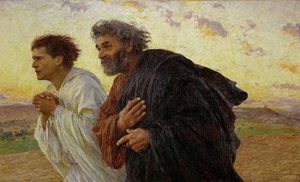
They are convinced the women have lost their minds as they think Jesus’ body has been removed. (Lk.24:11)
The disciples of Emmaus will be told they are “foolish men, slow to believe…” (Lk.24:25)
Believing – not seeing, not understanding, not being able to explain, or justify,
But BELIEVING, plainly and simply.
Not only admitting some articles of a creed that one recites with devotion…
Not solely repeating the explanations one has received long ago about ‘the truths of our religion’…
Not being satisfied with accepting the contents of dogmas passed on to us…
But BELIEVING in deed and in truth.
Trusting Someone to the utmost, unconditionally.
Relying on that Someone even in the midst of the most trying situations.
Surrendering to that Someone all that I am and hope to become…
Some may think: ‘It is stupid, absurd, it is pointless any way.
Only people who are naive and gullible can believe.’
Yet, all things considered, perhaps it is foolish… NOT to believe!…
Note: Another reflection is available on a different theme in French at: https://image-i-nations.com/dimanche-de-paques-annee-c-2019/
Source: Image: Wikipedia
Good Friday, Year C – 2019
When things get mixed up… there is chaos, confusion, people get… lost.
This was what we were up to and our condition was rather… desperate – we needed help.
Someone came – Someone with a capital S…
But… things got mixed up for him as well.
He had come as a servant but they made him a king! 
A case of… ‘mistaken identity’?
Pilate stood his ground: “What is written is written” (Jn.19:22).
Worse still: He was the Word,
but the religious leaders of his people used the word of God – their Torah – to condemn him!
They had tried more than once:
“The Law of Moses commanded us, what do you say?” (Jn.8:5)
 Finally they had come up with:
Finally they had come up with: 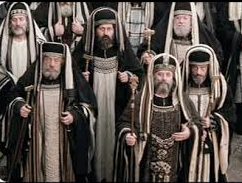
“You don’t seem to have grasped the situation at all!
You do not realize that it is better for you that one man die for the people
than that the whole nation perish.” (Jn.11:50)
And the text goes on:
“He did not speak in his own person, it was as high priest that he made this prophecy.”
They were afraid to lose to the Romans their ‘’Holy Place’ so… they were ready to kill the Holy One…
And they did, they obtained from the Roman procurator what he did not really want to grant them:
the condemnation of an innocent…
Today, as we look at the Crucified one, we remember his Seven Last Words.
For many years, Christians have meditated on them.
But… do we remember with the same faithfulness all the other words he spoke during his life on this earth?
Do we recall especially the ONE word he left us as his testament?
“Love one another as I have loved you.” (Jn.13:35)
It is perhaps more challenging, more demanding, more directly addressed to each one of us
than the seven others we have chosen to list and remember with devotion?…
Note: Another reflection is available on a different theme in French at: https://image-i-nations.com/vendredi-saint-annee-c-2019/
Source: Images: wikipedia ecosia.org youchepcatholic.org
Holy Thursday, Year C – 2019
So many ideas come to mind when we observe and reflect on what happened on the first Thursday
we now call Holy Thursday.
We need to see, yes, but we need also to… listen,
listen to what is said by this man who is aware that his life is soon coming to an end.
He has much to say to his apostles, the friends who have walked with him for the past 3 years.
But very early on during their celebration of the Passover meal, he asked them a question.
A very simple question, one that we ask one another very often.
But the answer to HIS question is very… demanding:
“Do you understand?…” (Jn.13:12)
During the years spent with him, many times his apostles had not understood what he was saying
or what he was doing.
They waited to question him at night time, away from the crowds. (Mk.4:10; 7:17)
One day, he had openly asked them:
“Do you not yet understand? Have you no perception? Are your minds closed?” (Mark 8:17)
That was some time ago, what about tonight?… 
He had just done something unusual for the ‘Teacher’ that he is: He had washed their feet –
the work of a servant.
No wonder, he needs to ask:
“Do you understand what I have done for you?”
He goes on to explain the meaning of his unusual gesture. 
They are to learn from it – learn the hard lesson of service.
I ask myself: ‘What if Christ asked me today that very same question…’
What he has done for me… in my life… over the years…
Have I understood?
Somehow, I feel I need still to understand much of what he did… what he does for me every day…
Note: Another reflection is available on a different theme in French at: https://image-i-nations.com/jeudi-saint-annee-c-2019/
And a blog is also offered at: https://image-i-nations.com/noublie-pas-2/
Source: Images: Free Bible Images Pinterest
Palm Sunday, Year C – 2019
Different situations can provoke different reactions in us.
A threatening possibility can inspire fear.
The anticipation of a positive happening may cause joy.
A difficult problem may, of course, leave us puzzled.
In the gospel text at the beginning of this celebration of Palm Sunday (Lk.19:28-40),
there is something which I find always… surprising, even astonishing!
We see the scene of Jesus entering Jerusalem and we are told that: 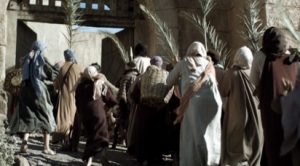
“The whole group of disciples joyfully began to praise God…
for all the miracles they had seen.”
You may think this is not surprising – and you are right.
Miracles awaken people to something wonderful happening in their midst.

What is surprising is what happened – or rather, what did NOT happen – five days later!…
When Jesus was brought before his judge – the Roman procurator – no one appears to speak for him.
I ask myself: all those who benefited from these miracles, where are they?
The blind who can now see,
the lame who now walk like everyone else,
the lepers free from their terrible condition,
all the sick suffering in one way or another and who are now well,
all of them, have they nothing to say to affirm that this man did nothing but good?
To me, this is really amazing! Not one comes up to witness in favour of Jesus.
Today, the crowd shouts with joy, the following Friday the crowd will shout again in… accusation.
Fickleness, yes, the ‘changeability’ of humans, of us…
I know someone who has coined a word to express the opposite – the word is ‘stick-to-it-ness’!
You will not find it in the dictionary but I believe that the reality of it should be found…
in our lives as disciples of Christ.
It is the faithful perseverance, or endurance.
And we have been told: “Your endurance will win you your lives” (Lk.21:19).
Note: Another reflection is available on a different theme in French at: https://image-i-nations.com/dimanche-des-rameaux-annee-c-2019/
Source: Images: worshiphousemedia.com imagenesmi.com
5th Sunday of Lent, Year C – 2019
This gospel scene of the woman caught committing adultery is presented in a manner at once vivid and truly inspiring (Jn.8:1-11).
There is even (for those who would not know the story) a touch of… suspense!
About this text, spiritual writers and Bible exegetes have published many articles and commentaries.
Yet, there is one aspect I have never seen referred to…
You could say it is ‘a matter of… attitude’!
While the scribes and Pharisees accuse the woman, Jesus has bent down and is writing in the sand.
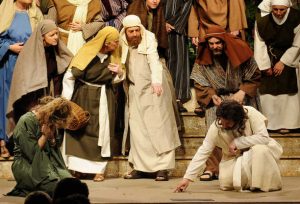 To reply to the accusers who are now questioning him, Jesus gets up, looking straight at them.
To reply to the accusers who are now questioning him, Jesus gets up, looking straight at them.
His reply catches them unawares, or rather all too aware of their own past conduct!
But having spoken to them, Jesus stoops down again.
He had placed himself at the level of the accusers, now he returns to the level of the woman –
a woman surely very ashamed and probably trembling with the fear that her life may be coming to an end.
God coming down to our level… is this not essentially the meaning of what theologians call ‘Incarnation’ –
God becoming one of us “in all things but sin”, we are told (He.4:15).
Yes, God has come down to our level and… he remains there – with us and for us.
This woman would possibly not have been able to put this reality into words,
but she had made the experience of it and would never forget it!
Yet, it seems that many of us… forget it, or is it that… we cannot believe it?!
Note: Another reflection is available on a different theme in French at: https://image-i-nations.com/5e-dimanche-du-careme-annee-c-2019/
And, in a video, Jeannie Calavrias presents the meeting of Jesus with the adulterous woman at: https://image-i-nations.com/the-woman-caught-in-adultery/
Source: Image: bilderbe
4th Sunday of Lent, Year C – 2019
“When he came do his senses…” (Lk.15:11-32)
Herding pigs, for a Jew, was a shameful occupation.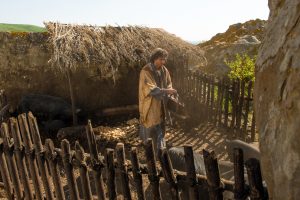
To a Jew faithful to the prescriptions of the Law, these animals were considered ‘impure’.
And there he was, minding pigs for the owner who did not even give him a share of the food the pigs were eating.
Could he go any lower?
He had left with his small fortune thinking it would last much longer.
But he had enjoyed it to the full until… it was all spent – nothing left even to survive.
He was hungry and there was a famine in the country so not much food around
let alone sympathy for someone like him!
Illusion, denial, escapism, – all the modern vocabulary could apply.
He needed to real-ize what he had done, what he had become, to see himself for real!
He had not much choice but to come out of his dream-like adventure and face his present situation.
It is somehow surprising that as he ‘comes to his senses’, he thinks first of all
of the fair salary and the privileged condition of the workmen employed by his father.
He remembers how life could be good at home if he had been willing to notice it.
But he seems still unaware of where this goodness came from.
He has yet to discover, to understand something of his father’s love.
For this, he must set on the return journey.
He has known need and regret, he must still experience the tenderness and forgiveness of his father.
This period of Lent gives us the same opportunity of a return journey…
if only we, too, ‘come to our senses.’
Note: Another reflection is available on a different theme in French at: https://image-i-nations.com/4e-dimanche-du-careme-annee-c-2019/
And, in a short video, France Doucet shares with us her insight into this parable at: https://youtu.be/cyaE_S4WqGI
One can also look at: https://image-i-nations.com/des-mains-differentes/
Source: Image: lds.org
3rd Sunday of Lent, Year C – 2019
It happens that we go to some neighbours, friends, colleagues, to ask for something.
What do we actually request from them?
We may want some help, information, cooperation, assistance for this or that purpose.
We may also hope to receive from them understanding, sympathy, friendship.
Today’s gospel text (Lk.13:1-9) gives us to meet someone who asks for something totally different.
We hear him say: ”Give me time.”
The owner of the vineyard for whom he works as a gardener has told him to uproot a fruitless fig tree.
But this gardener wants to try again to save the tree and have it produce fruit as the owner expects.
So, he asks earnestly: ”Give me time.”
This gospel text is sometimes called: ‘the gospel of the second chance’. 
Some even name it: ‘the gospel of the last chance’.
Perhaps TIME is that for each one of us – a second chance.
To do what?
- to outgrow our childish ways…
- to take our responsibilities seriously…
- to develop some talent left unused up to now…
- to come to the help of someone in need…
- to discover the important and precious things in life…
- to give oneself moments of relaxation, creativity, enjoyment…
- to be more aware of what our existence on this earth is all about…
TIME to… meet God!
This time of Lent is a good period, yes, a good TIME for all of that!
Note: Another reflection is available on a different theme in French at: https://image-i-nations.com/3e-dimanche-du-careme-annee-c-2019/
Source: Image: Dissolve
2nd Sunday of Lent, Year C – 2019
The texts from the Bible are often presented in a language quite different from our own way of speaking.
Different types of literature are used to transmit to us the message of God.
And, not only is the language different but, often too, the scenes represent actions and reactions that may seem foreign to our culture – and they are!
But the message has definitely something very appropriate for our own lives!
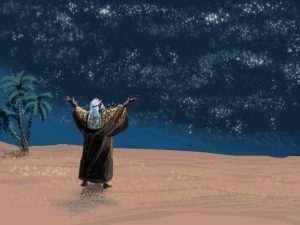 The 1st reading of this Sunday (Gn.15:5-12,17-18) is a good example of this.
The 1st reading of this Sunday (Gn.15:5-12,17-18) is a good example of this.
The scene describes God who invites Abraham to enter a special friendship with him –
this is the meaning of the word ‘alliance’, a pact, an agreement of close relationship between two people.
Strange enough, God asks Abraham for something… quite impossible!
“Look up at the sky and count the stars…”
Who could do this? An impossible task if ever there was one!
But God adds: “If you can…”
This text which would not usually attract the comments of writers on the Bible has struck me.
The reason is that it illustrates, for me, the pedagogy of God!
God knows well what we can or cannot do, but… we are not always aware of this ourselves!
We are not always conscious of our tremendous potential and our limitations!
And, as important and even more so: we need to become aware of what God can do… if only we allow him.
We know and it is often repeated to us that God can do everything.
Yes, everything except… one, I believe!
He cannot, he does not, infringe on the freedom he has given us.
God calls, he invites, he may urge, or even… cajole us into friendship with him but it is a decision WE must make.
The decision of accepting him in our lives, every aspect of it, every situation, every moment…
A good thing to remember… the next time you lift up your eyes to the sky… and see the stars!
Note: Another reflection is available on a different theme in French at: https://image-i-nations.com/2e-dimanche-du-careme-annee-c-2019/
Source: Images: The Jerusalem Post The conversation
1st Sunday of Lent, Year C – 2019
“It is too good to be true!” – no doubt, you have heard these words as well as I have.
Some people do not want to be seen as naive, or gullible, believing easily any piece of good news.
They are not trusting easily the messengers of happy tidings.
Strange – and sad to say – some will even doubt THE… ‘good news’!
The good news of who God is and what he wants to be for us.
It is true that he goes far beyond what we could expect or even dream of.
This thought comes to me as I read again the words of today’s response
to the 1st reading (Ps.91:1-2,10-15) where God himself says:
 “I rescue all who cling to me,
“I rescue all who cling to me,
I protect whoever knows my name,
I answer everyone who invokes me,,
I am with them when they are in trouble.”
“All… Whoever… Everyone…”
No restriction, no limits, no qualification or credentials required.
No past experience or achievement of any kind.
One and all are acceptable to this God of ours –
a God who is waiting, always waiting for our return to him.
This is what Lent is about, is it not?
To return and to REMIND ourselves of this amazing truth…
When it is God who speaks, is it not too good NOT to be true!
Note: Another reflection is available on a different theme in French at: https://image-i-nations.com/1er-dimanche-du-careme-annee-c-2019/
A short video is also available on this theme in French: https://youtu.be/cpfWC7eed1A
Source: Image: Kozman

